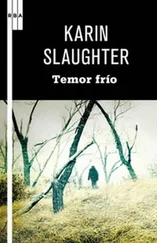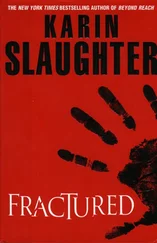
Karin Slaughter
Indelible
The fourth book in the Grant County series
FOR D.A.
river deep, mountain high
8:55 A.M.
Well, look what the cat dragged in," Marla Simms bellowed, giving Sara a pointed look over her silver-rimmed bifocals. The secretary for the police station held a magazine in her arthritic hands, but she set it aside, indicating she had plenty of time to talk.
Sara forced some cheer into her voice, though she had purposefully timed her visit for Marla's coffee break. "Hey, Marla. How're you doing?"
The old woman stared for a beat, a tinge of disapproval putting a crease in her naturally down-turned lips. Sara forced herself not to squirm. Marla had taught the children's Sunday school class at the Primitive Baptist from the day they opened the front doors, and she could still put the fear of God into anyone in town who'd been born after 1952.
She kept her eyes locked on Sara. "Haven't seen you around here in a while."
"Hm," Sara offered, glancing over Marla's shoulder, trying to see into Jeffrey's office. His door was open but he was not behind his desk. The squad room was empty, which meant he was probably in the back. Sara knew she should just walk behind the counter and find him herself – she had done it hundreds of times before – but survivor's instinct kept her from crossing that bridge without first paying the troll.
Marla sat back in her chair, her arms folded. "Nice day out," she said, her tone still casual.
Sara glanced out the door at Main Street, where heat made the asphalt look wavy. The air this morning was humid enough to open every pore on her body. "Sure is."
"And don't you look pretty this morning," Marla continued, indicating the linen dress Sara had chosen after going through nearly every item of clothing in her closet. "What's the occasion?"
"Nothing special," Sara lied. Before she knew what she was doing, she started to fidget with her briefcase, shifting from one foot to the other like she was four instead of nearly forty.
A glimmer of victory flashed in the older woman's eyes. She drew out the silence a bit more before asking, "How's your mama and them?"
"Good," Sara answered, trying not to sound too circumspect. She wasn't naive enough to believe that her private life was no one else's business – in a county as small as Grant, Sara could barely sneeze without the phone ringing from up the street with a helpful "Bless you" – but she would be damned if she'd make it easy for them to gather their information.
"And your sister?"
Sara was about to respond when Brad Stephens saved her by tripping through the front door. The young patrolman caught himself before he fell flat on his face, but the momentum popped his hat off his head and onto the floor at Sara's feet. His gun belt and nightstick flopped under his arms like extra appendages. Behind him, a gaggle of prepubescent children squawked with laughter at his less-than-graceful entrance.
"Oh," Brad said, looking at Sara, then back to the kids, then at Sara again. He picked up his hat, brushing it off with more care than was warranted. She imagined he could not decide which was more embarrassing: eight 10-year-olds laughing at his clumsiness or his former pediatrician fighting an obvious smile of amusement.
Apparently, the latter was worse. He turned back to the group, his voice deeper than usual as if to assert some authority. "This, of course, is the station house, where we do business. Police business. Uh, and we're in the lobby now." Brad glanced at Sara. To call the area where they stood a lobby was a bit of a stretch. The room was barely ten feet by eight, with a cement block wall opposite the glass door at the entrance. A row of photographs showing various squads in the Grant County police force lined the wall to Sara's right, a large portrait in the center showing Mac Anders, the only police officer in the history of the force who had been killed in the line of duty.
Across from the portrait gallery, Marla stood sentry behind a tall beige laminate counter that separated visitors from the squad room. She was not a naturally short woman, but age had made her so by crooking her body into a nearly perfect question mark. Her glasses were usually halfway down the bridge of her nose, and Sara, who wore glasses to read, was always tempted to push them back up. Not that Sara would ever do such a thing. For all Marla knew about everybody and their neighbor – and their dog – in town, not much was known about her. She was a widow with no children. Her husband had died in the Second World War. She had always lived on Hemlock, which was two streets over from Sara's parents. She knitted and she taught Sunday school and worked full-time at the station answering phones and trying to make sense of the mountains of paperwork. These facts hardly offered great insight into Marla Simms. Still, Sara always thought there had to be more to the life of a woman who had lived some eighty-odd years, even if she'd lived all of them in the same house where she had been born.
Brad continued his tour of the station, pointing to the large, open room behind Marla. "Back there's where the detectives and patrol officers like myself conduct their business…calls and whatnot. Talking to witnesses, writing reports, typing stuff into the computer, and, uh…" His voice trailed off as he finally noticed he was losing his audience. Most of the children could barely see over the counter. Even if they could, thirty empty desks spread out in rows of five with various sizes of filing cabinets between them were hardly attention grabbing. Sara imagined the kids were wishing they had stayed in school today.
Brad tried, "In a few minutes, I'll show y'all the jail where we arrest people. Well, not arrest them," he gave Sara a nervous glance, lest she point out his mistake. "I mean, this is where we take them after we arrest them. Not here, but back in the jail."
Silence fell like a hammer, only to be interrupted by an infectious giggle that started in the back of the group. Sara, who knew most of the children from her practice at the children's clinic, hushed a few with a sharp look. Marla took care of the rest, her swivel chair groaning with relief as she raised herself above the counter. The giggling shut off like a faucet.
Maggie Burgess, a child whose parents gave more credence to her opinion than any child of that age ought to be given, dared to say, "Hey, Dr. Linton," in a grating, singsong voice.
Sara gave a curt nod. "Maggie."
"Uh," Brad began, a deep blush still souring his milk-white complexion. Sara was keenly aware of his gaze lingering a little too long on her bare legs. "Ya'll…uh…y'all know Dr. Linton."
Maggie rolled her eyes. "Well, yeah, " she said, her sarcastic tone reviving a few giggles.
Brad pushed on. "Dr. Linton is also the medical examiner in town, in addition to being a pediatrician." He spoke in an instructional tone, though surely the children already knew this. It was a subject of great humor on the bathroom walls at the elementary school. "I imagine she's here on county business. Dr. Linton?"
"Yes," Sara answered, trying to sound like Brad's peer rather than someone who could remember him bursting into tears at the mere mention of a shot. "I'm here to talk to the Chief of Police about a case we're working on."
Maggie opened her mouth again, probably to repeat something horrible she had heard her mother say about Sara and Jeffrey's relationship, but Marla's chair squeaked and the child remained silent. Sara vowed she would go to church next Sunday just to thank the woman.
Читать дальше













